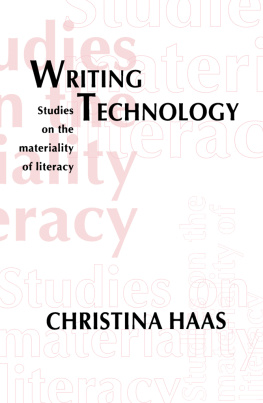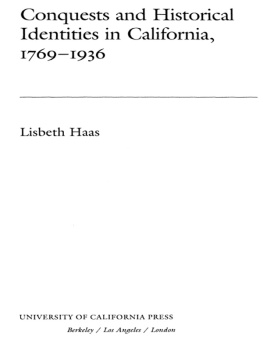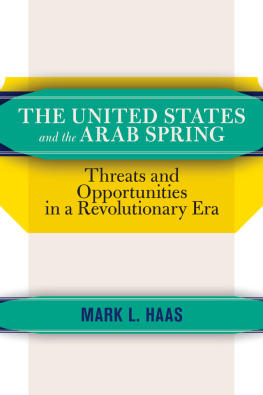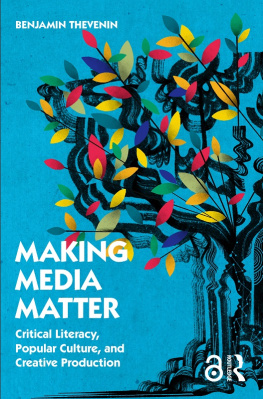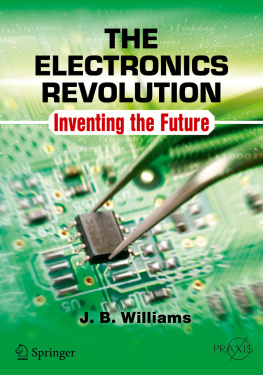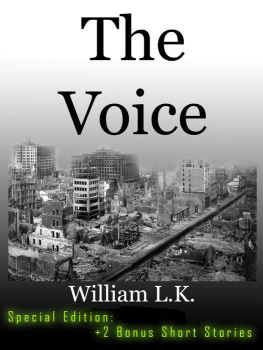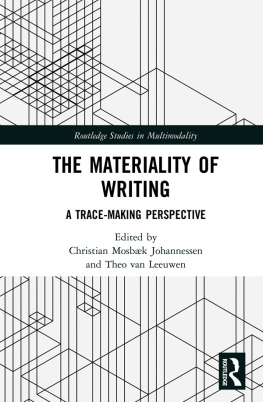Haas - Writing Technology : Studies on the Materiality of Literacy
Here you can read online Haas - Writing Technology : Studies on the Materiality of Literacy full text of the book (entire story) in english for free. Download pdf and epub, get meaning, cover and reviews about this ebook. City: Hoboken, year: 2013, publisher: Routledge;Taylor and Francis, genre: Romance novel. Description of the work, (preface) as well as reviews are available. Best literature library LitArk.com created for fans of good reading and offers a wide selection of genres:
Romance novel
Science fiction
Adventure
Detective
Science
History
Home and family
Prose
Art
Politics
Computer
Non-fiction
Religion
Business
Children
Humor
Choose a favorite category and find really read worthwhile books. Enjoy immersion in the world of imagination, feel the emotions of the characters or learn something new for yourself, make an fascinating discovery.
- Book:Writing Technology : Studies on the Materiality of Literacy
- Author:
- Publisher:Routledge;Taylor and Francis
- Genre:
- Year:2013
- City:Hoboken
- Rating:4 / 5
- Favourites:Add to favourites
- Your mark:
Writing Technology : Studies on the Materiality of Literacy: summary, description and annotation
We offer to read an annotation, description, summary or preface (depends on what the author of the book "Writing Technology : Studies on the Materiality of Literacy" wrote himself). If you haven't found the necessary information about the book — write in the comments, we will try to find it.
Moving from a vague sense that writing is profoundly different with different material and technological tools to an understanding of how such tools can and will change writing, writers, written forms, and writings functions is not a simple matter. Further, the question of whether -- and how -- changes in individual writers experiences with new technologies translate into large-scale, cultural revolutions remains unresolved.
This book is about the relationship of writing to its technologies. It uses history, theory and empirical research to argue that the effects of computer technologies on literacy are complex, always incomplete, and far from unitary -- despite a great deal of popular and even scholarly discourse about the inevitability of the computer revolution. The author argues that just as computers impact on discourse, discourse itself impacts technology and explains how technology is used in educational settings and beyond.
The opening chapters argue that the relationship between writing and the material world is both inextricable and profound. Through writing, the physical, time-and-space world of tools and artifacts is joined to the symbolic world of language. The materiality of writing is both the central fact of literacy and its central puzzle -- a puzzle the author calls The Technology Question -- that asks: What does it mean for language to become material? and What is the effect of writing and other material literacy technologies on human thinking and human culture? The author also argues for an interdisciplinary approach to the technology question and lays out some of the tenets and goals of technology studies and its approach to literacy.
The central chapters examine the relationship between writing and technology systematically, and take up the challenge of accounting for how writing -- defined as both a cognitive process and a cultural practice -- is tied to the material technologies that support and constrain it. Haas uses a wealth of methodologies including interviews, examination of writers physical interactions with texts, think-aloud protocols, rhetorical analysis of discourse about technology, quasi-experimental studies of reading and writing, participant-observer studies of technology development, feature analysis of computer systems, and discourse analysis of written artifacts. Taken as a whole, the results of these studies paint a rich picture of material technologies shaping the activity of writing and discourse, in turn, shaping the development and use of technology.
The book concludes with a detailed look at the history of literacy technologies and a theoretical exploration of the relationship between material tools and mental activity. The author argues that seeing writing as an embodied practice -- a practice based in culture, in mind, and in body -- can help to answer the technology question. Indeed, the notion of embodiment can provide a necessary corrective to accounts of writing that emphasize the cultural at the expense of the cognitive, or that focus on writing as only an act of mind. Questions of technology, always and inescapably return to the material, embodied reality of literate practice. Further, because technologies are at once tools for individual use and culturally-constructed systems, the study of technology can provide a fertile site in which to examine the larger issue of the relationship of culture and cognition.
Haas: author's other books
Who wrote Writing Technology : Studies on the Materiality of Literacy? Find out the surname, the name of the author of the book and a list of all author's works by series.

